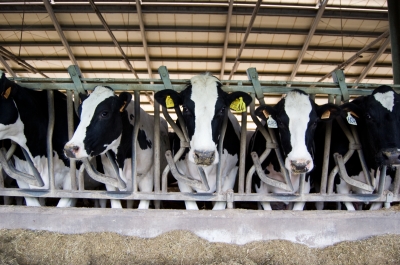Much To Do About Poo: Recent Challenge to the Development of an Illinois Megadairy
 Thursday, January 6, 2011 at 1:57PM
Thursday, January 6, 2011 at 1:57PM I hope I got your attention with the title. This case is no laughing matter. The Second District Court of Appeals in Illinois recently released their opinion Helping Others Maintain Environmental Standards v. A.J. Bros., No. 08-CH-42. People in Nora Township and other environmentalists got together to challenge a proposed “megadairy.” Each of the two proposed facilities would have the capability of holding 6,850 cows. If both facilities were developed and fully stocked, Nora Township residents would have a cow-covered landscape: 13,700 to be exact.

Even more impressive is the amount of waste produced by that many cows. Just one facility would have three “livestock waste holding ponds.” The dimensions for these “ponds”: 300 x 855 x 20 feet, 760 x 850 x 20 feet, and 400 x 400 x 20 feet. I’m no mathematician, but my amateur calculations lead me to this conclusion. If each proposed pond were combined into one gigantic pond, it would be as large as 60 football fields and then 20 feet deep! Now fill that that mega pond with cow manure and you have one big pile of poo.
Here’s how I boil down the conflict-causing issues in this case: (1) Will the mega poo pond contaminate ground water? (2) Will it stink so bad neighbors won’t be able to enjoy the use of their homes.
You may not know this about me, but I’m very interested in Agricultural Law, the rules that govern how the food we eat is grown, fertilized, distributed, sold, taxed, certified, etc. This case gave me some insight into how those food specific laws interact with good old fashion common law, like nuisance and trespass. I won’t bore you with all the details. Here are some interesting points:
- The concerned residents argued that there should be an implied right of action under the Livestock Act, giving them standing to sue the developer and the Department of Agriculture. Implied rights of action are difficult to get because, in essence, they overrun the legislatures right to say how the law should be enforced. In other words, if the legislature intended a private right of action, they would have put one in the Act. The court examined the four factors and found several missing. Therefore, no implied right of action.
- Even though the residents didn’t have standing to sue under the Livestock Act, they still had their common law rights, which gave them some temporary relief when they sought a temporary injunction.
- Residents lost at the trial level when they asked for a permanent injunction (using their common law rights to permanently stop construction of the megadairy) because they didn’t bring enough convincing evidence to the courtroom to show that there is permeable rock below where the ponds will be built. Without a strong showing of inevitable water contamination, the residents lost.
To me, this case is a picture of the changes happening in agriculture in America. Movement toward maximum profit means huge operations. Challenging that movement in court when you’re the mega farmer’s neighbor isn’t impossible, but it’s certainly not easy.
 HaskeLaw.com | Comments Off |
HaskeLaw.com | Comments Off |  Ag Law
Ag Law 